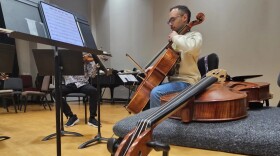-
The proposed Alzheimer's awareness campaign would include advertising, a website and resource guide, health provider education, and in-person outreach to underserved communities.
-
The Alzheimer's Association also seeks support from legislators for a measure on giving caregivers respite time and funding for its Brain Bus, which travels the state bringing awareness on brain health.
-
The university's School of Performing Arts and College of Medicine are working together on an experiment to better understand how music affects dementia patients.
-
Neurotoxin levels were highest in the dolphins stranded during warmer months, when harmful algal blooms are more severe.
-
The kits are designed to jog memories and initiate conversation between patients and their caregivers.
-
The first large-scale clinical trial on Alzheimer's in the U.S. shows that behavior can have an important impact on brain health.
-
Seniors experiencing cognitive decline are finding help through a program at Stetson University -- an example of what the recent U.S. Pointer study found is beneficial for people at risk of Alzheimer's.
-
Lakshmi Kunta was diagnosed about three years ago, and now at age 77, she is completely reliant on her husband and children to care for her.
-
A bill calls for the implementation of an Alzheimer’s Disease Awareness Program that would better educate residents on the importance of brain health and reducing the risk of dementia.
-
There’s increasing evidence that tackling 14 risk factors would delay or prevent nearly half of dementia cases.
-
Tampa resident Melissa Malone shares how she first recognized signs of dementia in her mother during the holidays and how she made adjustments to celebrate with her in the years after her diagnosis.
-
Providing affirming support to LGBTQ+ older adults could be one way to reduce their risk for dementia. These individuals face unique challenges compared to straight, cisgender seniors.
Play Live Radio
Next Up:
0:00
0:00
Available On Air Stations












